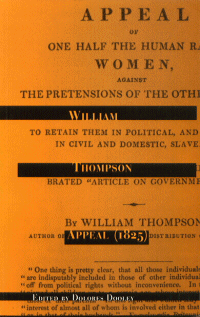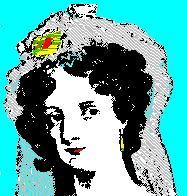She translated French socialist articles for the owenite press and lectured
widely on the condition of women and their rights as members of society and
equals with men.
Wheeler was a friend of Owen, Thompson and Bentham. Like Thompson, she
sometimes stayed in Bentham's house. One of Bentham's other friends, James
Mill (John Stuart's father) believed that nature inclines us all to seek
our individual pleasure at other people's expense. Wheeler and Thompson
contrasted this with Owen's view (which they supported) that ignorance is
the cause of selfishness whereas
rational self-interest
would see
individual welfare as part of everyone's welfare.
Somewhat inconsistently (if everyone is an egoist) James Mill considered
women's interests would be adequately covered at elections by their fathers
or husbands having a vote. Wheeler and Thompson thought that, in a
competitive system, this would mean women's interests were ignored. They
argued that if the object of government is to maximize human happiness,
then as much attention should be paid to women as to men. The Appeal
insisted that:
"Women are..as much entitled to happiness on their own account, for their
own sakes, as men".
(Thompson 1825 p.118)
As ignorance is why people fail to see their interests as mutual, is also
the reason that they seek power over one another. It has nothing to do with
"nature".
Ignorance and the competitive system support one another. Just as
politicians, landlords and capitalists achieve power over workers and use
it to exploit them, so men achieve power over women and use it to exploit
them. The remedy for such brutalizing selfishness lies in the theory and
practice of co-operation showing us where our true interests lie.
Such a society would not come about through a movement of men. Women, like
workers of both sexes, the Appeal said, would have to be active in
their own emancipation.
Benthamism +
Owenism = socialist feminism.
Andrew Roberts on the ideas of Jackie Lugg.
In The Making of the English Working Class,
Edward Thompson gives
the impression that utilitarianism was a middle class philosophy and
socialism its working class opposition. He condemns Owen as an
authoritarian paternalist who made a mental mess by mixing two incompatible
class philosophies.
I dislike reducing philosophy to class like this, so I welcomed Jackie's
argument that important socialist ideas developed from Bentham's
utilitarianism.
Bentham was not a socialist, but reading his unpublished manuscripts in
University College library has convinced Jackie that he was much more of a
radical than is normally believed.
In Bentham's manuscripts she found a distinction between "private" and
"universal" interests. Human nature consists of both. Private, acquisitive,
individual interests are necessary for survival of the species, but can
also lead communities to self-destruction.The universal, social or
public interest is the interest a person has in common with others.This
interest is ultimately responsible for "true happiness".
Bentham believed that society could be structured to maximize the universal
interest and minimize the "sinister" influence of the private. Such a
society would maximize human happiness.
There are similarities between this argument and the claim by Robert Owen
that society can be structured to encourage either
rational egoism
(knowing
that we have interests in common) or irrational egoism (selfishness).
There were none of these ambiguities in James Mill's version of human
nature. The argument that Thompson and Wheeler most objected to was in his
Essay on Government
(1820)
where he said that wealth and power over others
are the principle means by which we obtain happiness and that our desire
for them is limitless. (Mill,
James 1820 par.42
The
Appeal of..Women (1825) attacked this view as too
superficial.It
insisted that it is not a basic principle of human nature to trample on the
happiness of others any more than it is to promote their happiness. Both
are secondary principles. They are dependent on what we are taught is in
our interest:
"The original principle of human nature.. is simply the desire of happiness
and aversion to misery, without any wish, kindly or malignant, to others"
(Thompson 1825 p.13)
In competitive society, the Appeal says, women are held in an
"artificial cage" made by men.
Girls are held back from the same freedom of education, occupation and
enjoyment as boys and taught that the only escape from the cage of their
parents' home is into the false freedom of marriage. Entranced by the
delusions of romantic love they fly out, only to hear the door of another
cage snap behind them.
Thompson and Wheeler were not against marriage as such, but against
marriage structured by competitive society. This fostered power relations
between men and women instead of co-operation. Men have a biological edge
over women and, in competitive society, they use it to make social
instruments of domination, exploitation and constraint.
Similarly, outside the home, Thompson was against "forced labour".
Listening to Jackie's presentation it seemed to me that this concept had
two elements. Because they were poor, workers had no choice but to work for
the owners of land or capital (Durkheim called this the "forced division of
labour") and they did not keep all that they produced, a surplus was forced
from them in the form of rent and profit. (What Marx called "exploitation).
All these evils were the result of people being reared for competition.
They would not exist in co-operative society.
Behind Thompson and Wheeler's ideas on the co-operative alternative is an
idea of true as distinct from false happiness (a distinction Bentham
also made). Jostling for power and wealth in competitive society is not
real happiness. What we need for happiness is security of subsistence and
the freedom to develop our creative abilities.
So Thompson moves beyond the idea of freedom from restraint to a positive
idea of freedom similar to
John Stuart
Mill's.
Human emancipation
will involve the development of all individuals as autonomous beings with
equal opportunities for happiness.
Workers will only find such security and freedom through co-operation, and
women's liberation also will only be possible in such a society.Equal
rights in the present system are worth fighting for, but with equal rights
in a rat race women in general will be the losers.
Discussion
Jackie's talk was followed by a vigorous discussion about equality and
hierarchy which we can only give some of the points from. Felicity said
people are not equal. Children, for example, are under the authority of
their parents and it would not make sense otherwise. Jackie thought that
what applies to children, should not apply to adults. She said she did not
agree with the authority and paternalism in Owen's early ventures (New
Lanark and, initially, New Harmony). Andrew defended authority and
hierarchy. He commented that it was when Owen ran things that they worked.
Kate argued that socialism was not about pure equality anyway, but about
increasing equality in an unequal world.
BOOKS
BENTHAM, J. 1789 AN INTRODUCTION TO THE PRINCIPLES OF MORALS AND
LEGISLATION
HUME, D. 1739-1740 A TREATISE OF HUMAN NATURE 3 Books: Book 1 Of the
Understanding; Book 2 Of the Passions; Book 3 Of Morals; Each divided into
Parts and sections.
Thompson, W. 1825 Appeal of One-half the Human Race, Women, Against the
Pretensions of the Other Half, Men, to Retain Them in Political, and Thence
in Civil and Domestic Slavery. (1983 Reprint: Virago) (1994 Reprint:
Thoemmes Press).


 Bentham
Bentham
 Owen
Owen
 Thompson and
Wheeler
Thompson and
Wheeler




 Bentham Extracts
Bentham Extracts
 Owen Extracts
Owen Extracts
 Thompson and
Wheeler Extracts
Thompson and
Wheeler Extracts


 Bentham
Bentham
 Owen
Owen
 Thompson and
Wheeler
Thompson and
Wheeler




 Bentham Extracts
Bentham Extracts
 Owen Extracts
Owen Extracts
 Thompson and
Wheeler Extracts
Thompson and
Wheeler Extracts